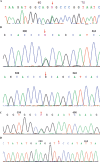Multiple gene mutations in patients with type 2 autoimmune pancreatitis and its clinical features
- PMID: 26155104
- PMCID: PMC4439988
- DOI: 10.5114/ceji.2014.42129
Multiple gene mutations in patients with type 2 autoimmune pancreatitis and its clinical features
Abstract
Background: It is now clear that there are two histological types (type 1 and type 2) of autoimmune pancreatitis (AI P). The histological substance of type 1 AI P is known as lymphoplasmacytic sclerosing pancreatitis (LPSP) or traditional AIP, and type 2 AIP is characterized by distinct histology called idiopathic duct centric pancreatitis (IDCP). Serum IgG4 increase is considered as a marker for type 1 AI P. Far less is known about type 2 and it lacks predicting markers, so it easily leads to missed diagnosis and misdiagnosis.
The aim of this study: The aim of this study was to describe multi-gene mutations in patients with type 2 AI P and its clinical features.
Material and methods: Three unrelated patients with type 2 AI P, 10 cases with type 1 AIP, 15 cases with other chronic pancreatitis and 120 healthy individuals were studied. The mutations and polymorphisms of 6 genes involved in chronic pancreatitis or pancreatic cancer - PRSS1, SPINK1, CFTR, MEN1, PKHD1, and mitochondrial DNA - were sequenced. Information of clinical data was collected by personal interview using a structured questionnaire.
Results: Novel mutations were found in the genes encoding for MEN1 (p.546 Ala > The) and PKHD1 (c. 233586 A > G and c. 316713 C > T) from patients with type 2 AIP. What is more, the serum TCR (T cell receptor) level is relatively higher in patients with type 2 AIP than in patients with type 1 AIP and other chronic pancreatitis or normal controls. Weight loss was the major manifestation and no patients had extrapancreatic involvement in type 2 AIP.
Conclusions: Type 2 AIP may occur with multi-gene mutations. For screening purposes, it is more reasonable to evaluate TCR levels in serum.
Keywords: autoimmune pancreatitis; gene mutations; serum TCR; type 2.
Figures



Similar articles
-
Autoimmune pancreatitis.Gland Surg. 2016 Jun;5(3):318-26. doi: 10.21037/gs.2015.11.02. Gland Surg. 2016. PMID: 27294040 Free PMC article. Review.
-
From Pathogenesis, Clinical Manifestation, and Diagnosis to Treatment: An Overview on Autoimmune Pancreatitis.Gastroenterol Res Pract. 2017;2017:3246459. doi: 10.1155/2017/3246459. Epub 2017 Jan 19. Gastroenterol Res Pract. 2017. PMID: 28197205 Free PMC article. Review.
-
Recent Advances in Autoimmune Pancreatitis.Gastroenterology. 2015 Jul;149(1):39-51. doi: 10.1053/j.gastro.2015.03.010. Epub 2015 Mar 12. Gastroenterology. 2015. PMID: 25770706 Review.
-
Autoimmune pancreatitis complicated with inflammatory bowel disease and comparative study of type 1 and type 2 autoimmune pancreatitis.J Gastroenterol. 2015 Jul;50(7):805-15. doi: 10.1007/s00535-014-1012-5. Epub 2014 Nov 16. J Gastroenterol. 2015. PMID: 25399203
-
PRSS1_p.Leu81Met mutation results in autoimmune pancreatitis.World J Gastroenterol. 2013 Jun 7;19(21):3332-8. doi: 10.3748/wjg.v19.i21.3332. World J Gastroenterol. 2013. PMID: 23745036 Free PMC article.
Cited by
-
Serum trypsin and TCR as novel markers for predicting disease activity in IgG4-related disease.Cent Eur J Immunol. 2014;39(2):193-7. doi: 10.5114/ceji.2014.43722. Epub 2014 Jun 27. Cent Eur J Immunol. 2014. PMID: 26155123 Free PMC article.
-
Autoimmune Pancreatitis: From Pathogenesis to Treatment.Int J Mol Sci. 2022 Oct 21;23(20):12667. doi: 10.3390/ijms232012667. Int J Mol Sci. 2022. PMID: 36293522 Free PMC article. Review.
-
Insights into the etiology and physiopathology of MODY5/HNF1B pancreatic phenotype with a mouse model of the human disease.J Pathol. 2021 May;254(1):31-45. doi: 10.1002/path.5629. Epub 2021 Mar 18. J Pathol. 2021. PMID: 33527355 Free PMC article.
-
An optimised mouse model of chronic pancreatitis with a combination of ethanol and cerulein.Cent Eur J Immunol. 2016;41(1):54-63. doi: 10.5114/ceji.2016.58816. Epub 2016 Mar 24. Cent Eur J Immunol. 2016. PMID: 27095923 Free PMC article.
-
Treatment Strategies for Chronic Pancreatitis (CP).Pharmaceuticals (Basel). 2025 Feb 24;18(3):311. doi: 10.3390/ph18030311. Pharmaceuticals (Basel). 2025. PMID: 40143090 Free PMC article. Review.
References
-
- Yoshida K, Toki F, Takeuchi T, et al. Chronic pancreatitis caused by an autoimmune abnormality. Proposal of the concept of autoimmune pancreatitis. Dig Dis Sci. 1995;40:1561–1568. - PubMed
-
- Uchida K, Okazaki K, Konishi Y, et al. Clinical analysis of autoimmunerelated pancreatitis. Am J Gastroenterol. 2000;95:2788–2794. - PubMed
-
- Kamisawa T, Chari ST, Giday SA, et al. Clinical profile of autoimmune pancreatitis and its histological subtypes: an international multicenter survey. Pancreas. 2011;40:352–358. - PubMed
-
- Kamisawa T, Notohara K, Shimosegawa T. Two clinicopathologic subtypes of autoimmune pancreatitis: LPSP and IDCP. Gastroenterology. 2010;139:22–25. - PubMed
LinkOut - more resources
Full Text Sources
Other Literature Sources
Research Materials
Miscellaneous
